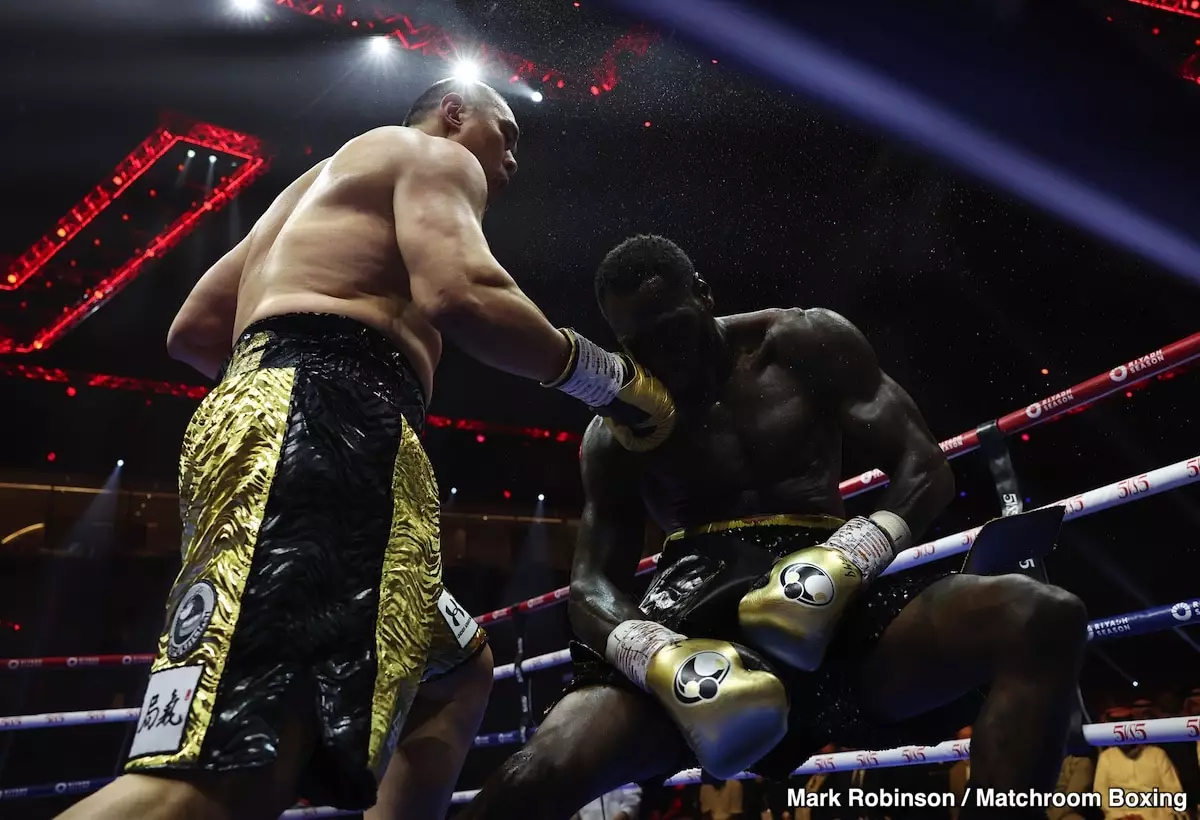Deontay Wilder, a former WBC heavyweight champion, finds himself in an alarming downward spiral in his boxing career, a situation that Derek Chisora has not shied away from commenting on. Chisora recently made headlines by claiming that Wilder’s trainer, Malik Scott, has significantly altered Wilder’s fighting style, transforming him from a fierce competitor into what Chisora describes as a “sissy.” This commentary sheds light on not just Wilder’s recent performances, but also raises questions about coaching influence in boxing, the importance of a fighter’s mentality, and the overall impact of training dynamics in a sport where aggression and power are paramount.
Wilder’s record since hiring Scott as his trainer following his third bout with Tyson Fury is a stark indication of his decline. With a record of just one win against Robert Helenius, alongside losses to Zhilei Zhang and Joseph Parker, fans and analysts alike are left to ponder whether Scott’s approach has stifled Wilder’s natural ability. Chisora’s metaphor of turning a “lion” into a “cat” accurately captures the essence of what many perceive to be a significant dilution of Wilder’s once fearsome fighting spirit.
What makes Chisora’s remarks noteworthy is the juxtaposition of Wilder’s early career, where he showcased explosive power and a willingness to engage, versus his more recent reluctance to unleash his potent right hand. The assertion that Malik Scott has failed to reignite that ferocity raises essential discussions regarding the vital bond between athlete and coach. Is Wilder’s hesitance a product of Scott’s coaching style, or is it a deeper issue rooted in Wilder’s psyche?
One of the key moments Chisora highlights is Wilder’s underwhelming performance against Joseph Parker. This defeat is particularly troubling as it showcased a stark contrast between the expectations placed on Wilder as a former champion and his actual output in the ring. Chisora critiques Wilder’s failure to engage aggressively, arguing that he allowed a fighter of Parker’s caliber, who is known to have weaknesses, to appear competent. The imagery of Wilder circling the ring without delivering significant punches speaks volumes about his current mindset.
Chisora’s assertion that Wilder could have easily clinched a victory if he had capitalized on his strengths serves as a rallying call to recognize how critical the mental aspect of boxing can be. This incident raises concerns: Has Scott instilled a sense of caution that has paralyzed Wilder’s instinctual fighting nature? The fallout from this match is evident not just in Wilder’s individual performance, but in the perceptions held by fans and analysts about his continued viability as a top-tier heavyweight.
The Wealth Factor: A Double-Edged Sword
Interestingly, Chisora notes that Wilder’s financial success offers him a cushion during this tumultuous time. Unlike many fighters who may be financially burdened by a downward career arc, Wilder’s wealth allows him a comfort that has led some to speculate on his drive and commitment. While Wilder enjoys a lifestyle that most can only dream of, it raises the question: does this comfort contribute to a complacency in his training and fighting approach?
The criticism directed at Scott could suggest that unless Wilder feels an urgent need to reclaim his former status, he may lack the motivation to make necessary changes. The combination of financial security and declining drive can be toxic, especially in a sport that demands raw determination and an unrelenting work ethic.
Recovery and Opportunities
Now nearing his 39th birthday, the clock is ticking for Wilder to make significant changes in his career trajectory. Chisora mentions the possibility of switching trainers as a potential remedy to reclaim the aggressive instincts that once defined his style. In an industry where fresh perspectives can rejuvenate a fighter, it begs the question of whether Wilder is too entrenched in his current setup to consider change.
Furthermore, should Wilder decide to part ways with Scott, he must find a coach capable of harnessing his physical gifts while reinvigorating his mindset. As the boxing community awaits Wilder’s next move, the overarching concern remains: can he rediscover the fierce lion that once roared in the heavyweight division, or is he destined to remain a subdued version of his former self?
The dialogue surrounding Derek Chisora’s criticisms serves not only as a reflection on Wilder’s career but also emphasizes the crucial role coaching plays in shaping a fighter’s destiny. As fans hope for a renaissance in Wilder’s approach, one cannot escape the reality that, just as the lion relies on its might, true champions must connect with their primal instincts to thrive in the unforgiving world of boxing.

